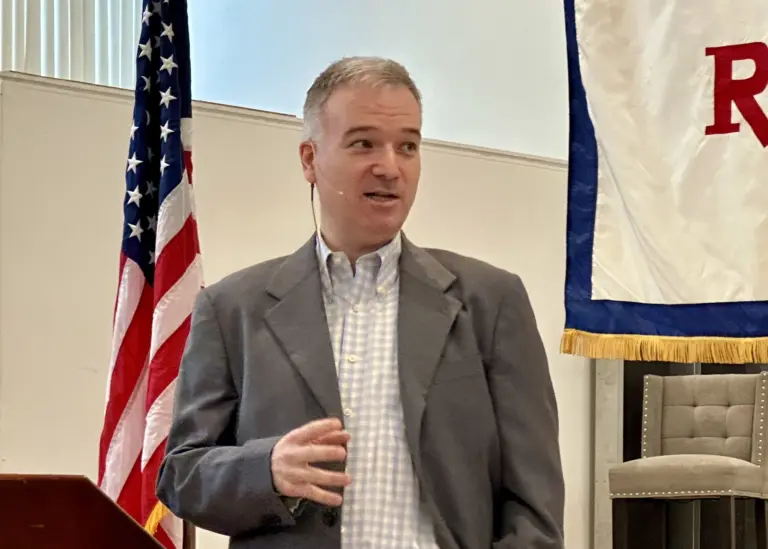
Deepening Rifts: A Battle Over Leadership of the RTC
By Beth Barhydt
[UPDATED Feb. 9, 9:45 a.m. Minor edits were made to clarify the sources of information in this article.]
The Greenwich Republican Town Committee (RTC) faces an unprecedented leadership crisis, as revealed in a series of candid interviews and statements to the Sentinel that underscore a struggle between the current RTC leadership and Greenwich Town Leaders. This crisis is not because of differing political views as much as it is over very different ideas of what it means to lead and to serve, setting a contentious backdrop for the upcoming March 5 RTC primaries.
First Selectman Fred Camillo’s honest, pointed criticism of the RTC’s current leadership underscores a deepening rift with Beth MacGillivray and Vice-Chair Joe Montanaro.
Camillo did not mince words when discussing the current leadership. “Pointblank no,” Camillo stated emphatically when asked about MacGillivray deserving another term. He accused the RTC leadership of orchestrating a divisive and misleading campaign, which he believes has negatively impacted the party’s image and electoral performance.
In 2022, the first year of the current RTC leadership, all three Greenwich State Representative races were won by Democrats, the best electoral performance ever by Democrats for state legislative seats.
Camillo was particularly scathing about the RTC leadership’s claims of taking credit for his and Selectwoman Lauren Rabin’s election victories. “It’s so ridiculous and so false,” he remarked. He attributed his and Rabin’s success just last fall to efforts of their teams and their supporters throughout town, rather than the RTC’s involvement. Camillo pointed out that despite the current leadership’s claims of achieving overwhelming victories, they faced significant losses, particularly in the RTC caucuses.
Expanding on what he characterized as misinformation spread by the RTC leadership, Camillo criticized their exaggeration of caucus turnouts. “They said they had record numbers turning out. That’s not even close to being true,” he asserted. Camillo also referenced historical attendance figures to debunk these claims, highlighting a stark contrast with past caucuses where he recalled nearly 300 people attending.
Moreover, Camillo expressed his frustration with the leadership’s tactics. He noted that their actions inspired a backlash by some voters. “Their behavior inspired the other side to really come out,” he explained, suggesting that the leadership’s approach had a counterproductive effect on the party’s performance.
Camillo’s critique went beyond election strategy to address his belief that the RTC’s leadership overreaches in governance. He highlighted instances where his name was used in RTC campaigns without his consent and emphasized that the RTC leadership failed even to put him on the agenda for RTC meetings, which was the first time he had ever seen that happen. “I’m not offended,” he explained. “It is just unprofessional and,” Camillo added, “they just don’t know what they’re doing, and yet tell everybody how wonderful their record is, and how they’re expanding the Republican base when every single statistic and election result points to a very very different reality.”
Reflecting on the upcoming RTC primaries, Rabin conveyed her dismay at the unfolding events pointing to the RTC’s efforts to undermine her position even after her caucus victory.
“I wanted to be on the RTC because, having won four competitive town wide elections, I wanted to lend my expertise to candidate selection because I think that’s what makes the difference,” Rabin explained to the Sentinel. She had served on the RTC previously for eight years, six as Treasurer, and said she felt it was a good time to return and help. “I was disappointed because the Vice-Chairman of the RTC, Joe Montanaro sent an email to Fred and me after the RTC caucuses with a list of reasons why I shouldn’t be a member,” Rabin disclosed, highlighting a direct attack on her position within the party. The email was cosigned by the entire RTC leadership including Beth MacGillivray, RTC Chair, Jane Sprung-RTC Vice-Chair, Gail Lauridsen-RTC Secretary, and Cheryl Resnick, RTC Treasurer.
Rabin said her disappointment stems not only from the personal affront but also from the broader implications of such actions on party unity and effectiveness. She articulated her concerns about the divisive nature of the current leadership’s approach. “The vice-chairman’s actions represent a troubling tendency within the RTC to prioritize internal politics over the broader goals of the party,” Rabin observed.
MacGillivray has been steadfast in her defense against the claims that she initiated the primaries. “I did not initiate the primaries,” she stated in an email to the Sentinel, emphasizing her role in supporting the party’s efforts. “I was delighted to have assisted in collecting signatures for some candidates,” MacGillivray added, portraying her involvement as one of support rather than initiation.
This defense is complicated by the fact that MacGillivray was the only person to circulate a petition in District 9, Lauren Rabin’s district.
MacGillivray also highlighted her engagement with the party base and the achievements under her leadership. “Engaging with our Republican base and discussing our party is always a pleasure for me,” she said, pointing to what she considers the successes of her tenure – high voter turnout, record fundraising, and a strong social media presence.
“The dedication of these candidates is a testament to their unwavering belief in the principles that make our party strong,” MacGillivray claimed, framing the primaries as an opportunity for party members to rally around shared values.
Republican State Central member Joe Solari expressed his support for the current RTC leadership. “These primaries present an important opportunity for Republicans in Greenwich to express their solidarity with the RTC members seeking reelection,” he stated in an email which also said he believes the RTC “preserved Republican leadership in the Selectman’s Office and the Board of Estimation and Taxation and delivered a resounding ‘Row B’ electoral victory by diligently championing and safeguarding Republican principles, achieving record fundraising, and mobilizing unprecedented voter turnout among Republicans in Greenwich.”
Joe Kelly, an RTC member from District 2 and former Chairman of the Board of Education, voiced to the Sentinel substantial concerns about the committee’s approach to governance and its relationship with elected officials. Kelly articulated a clear stance on the RTC’s role and its perceived overreach. “They feel since they nominated candidates that they have a right to force their will and make them speak on the RTC’s behalf,” he explained, highlighting a fundamental disagreement over the committee’s authority.
This critique points to a deeper issue within the RTC – the notion that nominating candidates imparts a level of control over them if they are elected. Kelly challenges this perspective, advocating for the autonomy of elected officials to represent their constituents rather than being beholden to the committee’s directives.
Kelly further elaborated on the RTC’s misaligned approach, “So they continue to say that they want a seat at the table of government of the town, yet the job, in my mind, of the RTC is to identify strong candidates and put them forward and let the people then elect the strong candidate and have that candidate answer to the people who elected them, not the RTC.”
His comments underscore a vision of the RTC’s role as facilitators of the democratic process, not as power brokers once elections are concluded. This distinction is crucial in understanding the rift within the party, where some members see the RTC’s role as extending into governance, while others, like Kelly, advocate for a more hands-off approach post-election.
He also touched on the personal impact of the RTC’s tactics. “I do even myself sometimes see the postings, the mean-spirited postings by the RTC management, and they’re trying to use bullying tactics,” Kelly shared, revealing an emotional toll that such tactics can have on party members. “People shouldn’t have to be subjected to that sort of mean-spirited behavior.”
Camillo’s forthright critique paints a picture of a party struggling with internal power dynamics and facing a leadership that he perceives as out of touch with both the electorate and elected officials.
The outcomes of the March 5 primaries will be a critical indicator of the party’s future direction and leadership.



